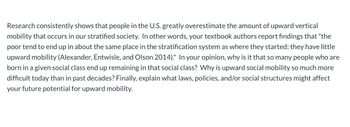
Social Psychology (10th Edition)
10th Edition
ISBN: 9780134641287
Author: Elliot Aronson, Timothy D. Wilson, Robin M. Akert, Samuel R. Sommers
Publisher: Pearson College Div
expand_more
expand_more
format_list_bulleted
Question

Transcribed Image Text:Research consistently shows that people in the U.S. greatly overestimate the amount of upward vertical
mobility that occurs in our stratified society. In other words, your textbook authors report findings that "the
poor tend to end up in about the same place in the stratification system as where they started; they have little
upward mobility (Alexander, Entwisle, and Olson 2014)." In your opinion, why is it that so many people who are
born in a given social class end up remaining in that social class? Why is upward social mobility so much more
difficult today than in past decades? Finally, explain what laws, policies, and/or social structures might affect
your future potential for upward mobility.
Expert Solution
This question has been solved!
Explore an expertly crafted, step-by-step solution for a thorough understanding of key concepts.
This is a popular solution
Trending nowThis is a popular solution!
Step by stepSolved in 3 steps

Knowledge Booster
Recommended textbooks for you
 Social Psychology (10th Edition)SociologyISBN:9780134641287Author:Elliot Aronson, Timothy D. Wilson, Robin M. Akert, Samuel R. SommersPublisher:Pearson College Div
Social Psychology (10th Edition)SociologyISBN:9780134641287Author:Elliot Aronson, Timothy D. Wilson, Robin M. Akert, Samuel R. SommersPublisher:Pearson College Div Introduction to Sociology (Eleventh Edition)SociologyISBN:9780393639407Author:Deborah Carr, Anthony Giddens, Mitchell Duneier, Richard P. AppelbaumPublisher:W. W. Norton & Company
Introduction to Sociology (Eleventh Edition)SociologyISBN:9780393639407Author:Deborah Carr, Anthony Giddens, Mitchell Duneier, Richard P. AppelbaumPublisher:W. W. Norton & Company The Basics of Social Research (MindTap Course Lis...SociologyISBN:9781305503076Author:Earl R. BabbiePublisher:Cengage Learning
The Basics of Social Research (MindTap Course Lis...SociologyISBN:9781305503076Author:Earl R. BabbiePublisher:Cengage Learning Criminalistics: An Introduction to Forensic Scien...SociologyISBN:9780134477596Author:Saferstein, RichardPublisher:PEARSON
Criminalistics: An Introduction to Forensic Scien...SociologyISBN:9780134477596Author:Saferstein, RichardPublisher:PEARSON Sociology: A Down-to-Earth Approach (13th Edition)SociologyISBN:9780134205571Author:James M. HenslinPublisher:PEARSON
Sociology: A Down-to-Earth Approach (13th Edition)SociologyISBN:9780134205571Author:James M. HenslinPublisher:PEARSON Society: The Basics (14th Edition)SociologyISBN:9780134206325Author:John J. MacionisPublisher:PEARSON
Society: The Basics (14th Edition)SociologyISBN:9780134206325Author:John J. MacionisPublisher:PEARSON

Social Psychology (10th Edition)
Sociology
ISBN:9780134641287
Author:Elliot Aronson, Timothy D. Wilson, Robin M. Akert, Samuel R. Sommers
Publisher:Pearson College Div

Introduction to Sociology (Eleventh Edition)
Sociology
ISBN:9780393639407
Author:Deborah Carr, Anthony Giddens, Mitchell Duneier, Richard P. Appelbaum
Publisher:W. W. Norton & Company

The Basics of Social Research (MindTap Course Lis...
Sociology
ISBN:9781305503076
Author:Earl R. Babbie
Publisher:Cengage Learning

Criminalistics: An Introduction to Forensic Scien...
Sociology
ISBN:9780134477596
Author:Saferstein, Richard
Publisher:PEARSON

Sociology: A Down-to-Earth Approach (13th Edition)
Sociology
ISBN:9780134205571
Author:James M. Henslin
Publisher:PEARSON

Society: The Basics (14th Edition)
Sociology
ISBN:9780134206325
Author:John J. Macionis
Publisher:PEARSON